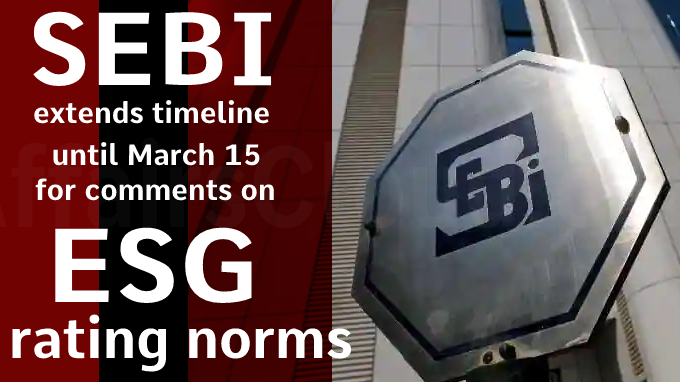
On March 8, 2023, the Securities and Exchange Board of India (SEBI) extended the timeline for submission of public comments on the consultation paper on ‘Regulatory Framework for ESG (Environmental, Social and Governance) Rating Providers (ERPs) in the Securities Market’ from March 8 to March 15 2023.
Background:
- On February 22, 2023, SEBI placed a consultation paper on Regulatory Framework for ERPs in Securities Market on its website seeking comments by March 08, 2023.
- The Consultation Paper also includes the regulatory framework of ESG Disclosures by listed entities, ESG Ratings in the securities market and ESG Investing by Mutual Funds to facilitate the balance between transparency, simplification and ease of doing business.
Key Regulations:
i.As per the proposed regulations, the ERPs would be registered with SEBI under the SEBI (Credit Rating Agencies) Regulations, 1999.
- The CRA Regulations would be amended to include a chapter for ERPs.
ii.ESG Disclosures: SEBI has mandated the top 1000 listed companies (by market capitalization) to make ESG disclosures as per the Business Responsibility and Sustainability Reporting (BRSR) from FY22 on a voluntary basis and mandatory from FY23.
- In FY22, more than 175 companies reported on the BRSR framework, on a voluntary basis.
iii.SEBI proposed a new ‘BRSR Core’ format comprising select essential indicators across all principles that can become the foundation of the assurance process.
iv.In the context of the BRSR Core framework, ERPs may also provide a Core ESG Rating, based on assured indicators.
Who is ERP and what is ESG Rating?
i.ESG rating provider is a body corporate which is engaged in or proposes to be engaged in, the business of ESG ratings.
ii.Under ESG ratings, the ratings provided for an entity that is listed/ proposed to be listed on a stock exchange based on its ESG profile or characteristics or exposure to ESG, governance risk, social risk, climatic or environmental risks or impact on society, climate and the environment.
-SEBI issues framework for REs for cloud services adoption
Due to the rise of dependence on cloud computing for delivering IT (Information Technology) services, SEBI drafted a cloud framework for the adoption of Cloud Services by SEBI Regulated Entities (REs).
- Objective: To highlight the key risks and mandatory control measures that REs need to know and follow before adopting cloud computing.
- The framework also provides baseline standards of security and for legal and regulatory compliances to be followed by the RE if they adopt such solutions.
- The REs include Stock Brokers through Exchanges, Clearing Corporations, Depositories, Asset Management Companies (AMCs)/mutual funds and KYC Registration Agencies (KRAs).
Key Points:
i.The framework will come into force immediately for all new or proposed cloud onboarding assignments/projects of the REs.
ii.The REs that are currently availing cloud services should be in compliance with the framework within 12 months and they should ensure that wherever applicable, all such arrangements are revised .
iii.The cloud framework covers Governance, Risk and Compliance (GRC), selection of Cloud Service Providers (CSPs), data ownership and data localisation, due- diligence by REs, security controls, legal and regulatory obligations, among others.
What is Cloud Computing?
Cloud computing is a model for enabling ubiquitous, convenient, on-demand network access to a shared pool of configurable computing resources (e.g., networks, servers, storage, applications, and services) that can be rapidly provisioned and released with minimal management effort or service provider interaction.
About Securities Exchange Board of India(SEBI):
Chairperson -Madhabi Puri Buch
Headquarters – Mumbai, Maharastra
Establishment – 12 April 1992




